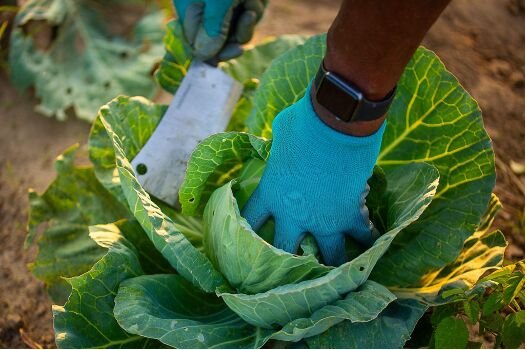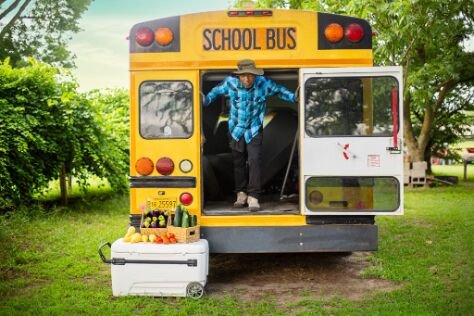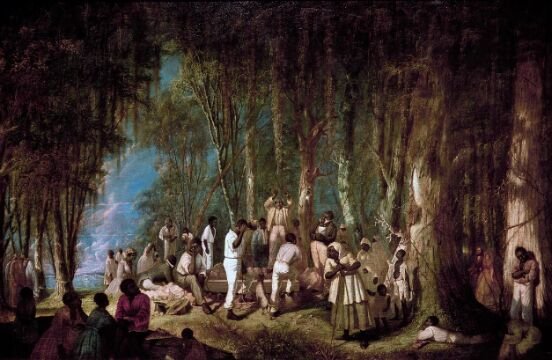By Tyler Yarbrough, Director of MS Delta Programs, PHA | Feb 25, 2025
Clarksdale, Mississippi – Black History Month is a celebration of the resilience, brilliance, and the undeniable role Black Americans have played in shaping this nation. It honors the well-known heroes — like Dr. Martin Luther King Jr., Thurgood Marshall, Fannie Lou Hamer — and the unsung individuals and sacred places that have advanced America’s highest ideals.
Yet, America has often fallen short of those ideals. Acknowledging this isn’t about dwelling on the past, it’s about pushing for real opportunity where grit, merit, and bold ideas drive progress. Too often, especially in places like my home, the Mississippi Delta, divisive identity politics, harmful narratives, and a lack of common sense have held communities back.
While systemic barriers have long caused harm to farmers and their communities, I believe our next chapter in our pursuit to honor unwavering grit, merit, and common sense will align with investments in projects that support stronger supply chains, local food production, and increase wealth attainment by the people and their descendants who were most harmed in the past.
Black History Month isn’t just about reflection — it’s about action. As the Director of Mississippi Delta Programs at Partnership for a Healthier America (PHA), I work daily to strengthen access to fresh, local, affordable food by lifting up and supporting local farmers, chefs, corner stores, farmers markets, creatives, and organizers working to transform the region’s food landscape.
Where Are the Black Farmers?
The Mississippi Delta’s rich agricultural heritage is deeply rooted in crops like cotton, corn, sweet potatoes, greens, and the beloved purple-hull pea. But this legacy is also marked by a history of racial and economic inequality. From slavery in the early 1800s to the exploitative sharecropping system that persisted into the 1960s, Black farmers have faced structural barriers that continue to shape today’s agricultural landscape. Discriminatory USDA lending practices and Heirs Property laws, where land passed down without a will leads to fractured ownership, have driven Black land loss and left families vulnerable to forced sales and legal exploitation.
Black farmland ownership, which peaked in 1910 at 16 to 19 million acres, has decreased to less than 3 million acres today, and Black farmers represent just over 1% of all U.S. farmers. In the 1930s, Mississippi was home to over 300,000 farmers. Today, that number has plummeted to just 55,000, with Black farmers making up only 11% of the agricultural workforce — despite agriculture remaining the state’s top industry, according to the MS Department of Agriculture.
Compounding this crisis, farmers are an aging demographic, and instead of passing their land and expertise to the next generation, many are forced to sell their acreage to large-scale farming operations. At the same time, young and new farmers face steep barriers to entry. Since 1970, the cost of entering the profession — including land, equipment, and seeds — has risen by 70% when adjusted for inflation.
Meanwhile, Mississippi’s average farm size has grown from 50 acres in the 1930s to over 300 acres today, favoring corporate agribusiness and wealthy landowners while pushing small farmers out. Without intervention, land consolidation will continue, limiting opportunities for a new generation of independent farmers and restricting local food production that could make our communities healthier.
A food and farming renaissance is necessary — not just to reclaim land to grow food, but to revitalize cultural farming practices and create pathways for Black communities to generate wealth. This is precisely what PHA is hoping to support through our work in the Delta. Together with stakeholders in my community, we are supporting the creation of an alternative narrative away from historical oppression, and towards economic empowerment. Visit Rootswell.org and follow us on Instagram and Facebook to learn more and join us on the journey.
Find Land, Grow Food: Advancing Black Farming Through Policy & Action
The Justice for Black Farmers Act, introduced by Senator Cory Booker, is an ambitious and necessary response to centuries of systemic discrimination against Black Farmers. It seeks to restore land ownership, provide financial assistance, and break down barriers that have long excluded Black farmers from thriving in agriculture. But like many transformative policies, its path to becoming law is steep, met with political resistance and structural challenges.
Rather than waiting for change to come from Washington, we’re proving that local action can pave the way. In the Mississippi Delta, we’re taking a practical, community-lead approach by reimagining how municipal owned land — particularly school grounds — can serve as a launchpad for the next generation of farmers. We’re demonstrating that this type of community-led approach is possible through the Happy Food Project, led by Farmer Robbie Pollard and partners ranging from the Community Foundation of Northwest Mississippi, the Community First Research Center at The University of Mississippi, and Delta Grows managed by the Center for Sustainable Agriculture Excellence. By securing a lease on land at Kirkpatrick Elementary School, the expansion of the Happy Food Project’s farming network will soon produce 2,000 heads of lettuce annually, showing how small-scale farming can take root in public and small spaces.
And this is just the beginning. In Clarksdale, MS alone, nearly every school sits adjacent to acres of underutilized land — land that could be growing food, creating jobs, and feeding students in the largest restaurants in our communities — the school cafeteria. By turning school grounds into community-driven farms, we can reduce barriers for new farmers, provide hands-on agricultural education, and strengthen our local food economy. It’s not just a good idea — it’s a scalable solution we’re piloting today!
The Justice for Black Farmers Act provides a national framework to support the next generation of farmers, but we don’t have to wait for federal action to start building real solutions. We’re proving that land doesn’t have to be an insurmountable challenge — it can start on the grounds of your neighborhood school. Join us in advocating for policies that support farmers while also taking action where we can. Whether it’s signing a local petition, pushing for programs like this in your city, or supporting community-led agriculture initiatives — the time to act is now!
A Hidden Story: Swan Lake Association’s 650 Acres and the Dream to Build Farmers
Nestled along a small creek, in Coahoma County is land that was once a Hush Harbor, a sacred gathering place where enslaved Africans secretly practiced their religious traditions and dreamed of liberation away from the plantations that sought to suppress them. After emancipation, these hidden spaces became the foundation for new churches and schools built by newly freed people.
Such is the history of St. James Missionary Baptist Church, established at the site of a former Hush Harbor outside of Jonestown, MS. In 1873, St.James and 16 other Black churches formed the Swan Lake Association. During the Second Great Migration, between the 1940s and 1950s, the Association acquired over 650 acres of land to provide Black families with farming opportunities and economic stability. This land offered a chance to break free from the sharecropping system, where many had worked hard without ever gaining any wealth from the crops they skillfully grew.
Today, Swan Lake Association, with support from PHA and in partnership with But God Ministries — a faith-based nonprofit dedicated to building sustainable communities in Haiti and Jonestown, MS — is working to establish a farm incubator program. Designed to empower existing, new, and aspiring farmers, this initiative will not only increase access to fresh produce in Mississippi Delta communities but also create jobs and build pathways to generational wealth.
In time, residents of the region will be able to say they are eating greens and peas grown on sacred land — the very land where their ancestors once prayed for freedom and a better future.
The Future Pea Capital of the World
Mississippi has 10.4 million acres of farmland, yet less than 1% is dedicated to fruits and vegetables. Instead, most land is used for subsidized cash crops — soybeans, corn, rice, and cotton — exported worldwide for profit. This isn’t purely market-driven; federal subsidies from Washington prioritize overproduction of these crops, making them artificially competitive for sale throughout the world. Meanwhile, nearly 20% of Mississippians face food insecurity, including 1 in 4 children. It’s time to rebalance our agricultural system so that more locally grown food can reach our communities and small-scale farmers have the opportunity to generate wealth.
This shift is urgent. Cash crops are frequent targets of international tariffs, creating economic instability due to our subsidization to sell and dominate foreign markets. At the same time, climate change threatens California’s dominance in fruit and vegetable production, with wildfires and droughts disrupting national supply chains and forcing the search for alternative regions to meet the nation’s food needs. Currently California produces ⅔ of all fruit and nuts and ⅓ of all vegetables grown in the United States. A 2020 World Wildlife Fund study, The Next California, identified the Mid-Mississippi River Delta as a prime candidate for expanding fruit and vegetable farming, including crops like lettuce, greens, peaches, and bell peppers.
Among these, one crop holds deep cultural and economic significance for Black farmers in the Delta: Peas. Small farmers in the region have long cultivated pinkeye purple hull peas, and Alcorn State University, the nation’s first Black public land-grant university, has been instrumental in advancing their production. In the early 2000s, Alcorn’s Extension Services and local co-ops launched the Pea Project, mechanizing shelling and laying the foundation for a commercial pea economy.
Now, a growing movement is working to fully mechanize pea harvesting, making it more efficient and profitable:
- Mississippi’s current Pea Industry relies heavily on Hand-picking peas which costs $400–$800 per acre, limiting scale.
- Mechanized harvesting cuts costs by up to 50%, saving time and increasing profitability
- The same harvesting equipment can process green beans, crowder peas, and edamame, diversifying farmers’ income.
By reducing costs and expanding production, small-scale farmers could cultivate more on existing land, bring underutilized land into production, and increase overall profitability.
So, could the Delta become the Pea Capital of the World? With the right support, absolutely!
I’m really proud of all the investments PHA has made in the Delta with our partners to lay the groundwork for a healthier future, but we need more support from companies, individuals, foundations and governments to really make this dream a reality.
This Black History Month, let’s do more than honor the past — let’s invest in the future. From the Pea Project to the Happy Food Project and the Swan Lake Association, these initiatives are laying the groundwork for a farming renaissance in the Mississippi Delta that can offer learnings for the rest of the country.
If you want to directly support farmers in the Delta, donate now to our GROW grants.
Click Here: GIVE TO GROW NOW!







